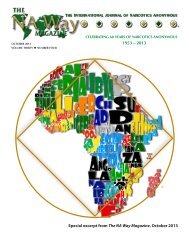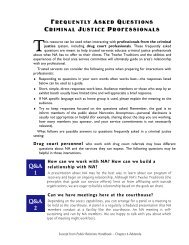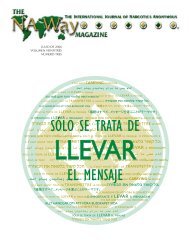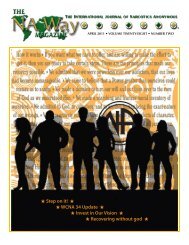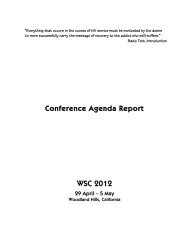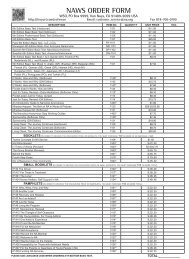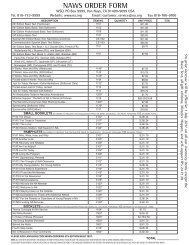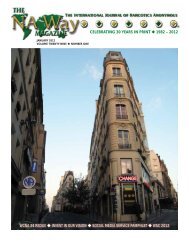Public Relations Handbook - Narcotics Anonymous
Public Relations Handbook - Narcotics Anonymous
Public Relations Handbook - Narcotics Anonymous
You also want an ePaper? Increase the reach of your titles
YUMPU automatically turns print PDFs into web optimized ePapers that Google loves.
autonomy. Members often need to be encouraged to recognize their ability tosupport themselves and how their contributions are a part of NA’s principle of selfsupport.Empowering members and groups with the necessary service materials andsupport is an important foundation of strongfellowship development efforts.Approaching members with an attitude ofgoodwill and with a lack of judgment will helpfellowship development efforts be moreproductive. Groups and areas may be operatingin a variety of different ways. It is not the job ofthose performing fellowship development tomanage these groups or areas. A group’s way ofcreatively carrying NA’s message can fosterenergy and excitement among group members.There are times, however, when these creative ways can become even more usefulto a group’s primary purpose. Members can offer tools that allow groups to findtheir own solutions. Trusted servants need to approach this service without anypreconceived ideas about members and groups that may not seem as “developed” astheir own groups. Our ability to respectfully support groups and members givesthem a better chance at more effectively carrying NA’s message to suffering addicts.Coordinating servicesSome areas have created a fellowship development committee or a similar kind ofcommittee that is responsible for coordinating all the service efforts for that area.Other area committees delegate the responsibility of fellowship development to theadministrative members of the area (usually the area chair, vice chair, treasurer, andsecretary), while other areas have created a group liaison or coordinator position.Sometimes, neighboring areas and regions will join together to perform fellowshipdevelopment service. As stated at the beginning of this chapter, some areas arealready providing what is called fellowship development here as outreach efforts.Regardless of how an area coordinates services, supporting other members andgroups is a responsibility of the entire area.Approaches“Groups and areas may beoperating in a varietyof different ways. It is notthe job of those performingfellowship developmentto manage these groupsor areas.”There are a variety of ways to approach fellowship development. When an area ispreparing for fellowship development, trusted servants can look at which approach ismore likely to meet the needs of the members who have requested support. Members can provide a way for NA communities to evaluate their own needs.Questionnaires or even informal inquiries through email, letters, or phone callscan help members discover what they believe is most needed. Having currentand relevant information about the area’s needs will help trusted servantsdecide which resources are likely to be most helpful. Trusted servants may need to educate groups and areas about the resourcesavailable to them. Some members and groups have no experience with thelarger service structure and the available support. Fellowship development efforts benefit from prioritization and planning.Fellowship development can place a strain on financial and human resources.For example, a region looking to support a neighboring area may decide to fundtrusted servants’ visits to the area. Without adequate planning, this supportcould cause the region to be in a position where they could, as a result of theirOctober 2006 | PR <strong>Handbook</strong> | 107



